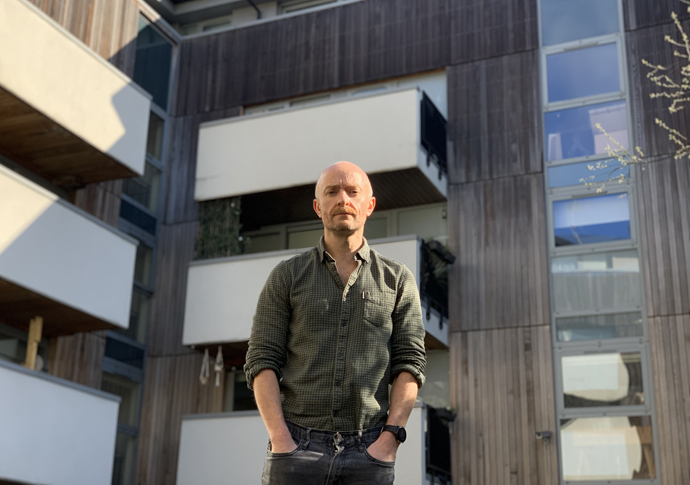‘Bankruptcy’ fear over cladding bills
Leaseholders dismayed as new Fire Safety Bill fails to include financial protection over works
Friday, 7th May 2021 — By Calum Fraser

Chris Gibbons: ‘We feel disappointed and let down’
TOWER block residents have been left in despair after parliament voted down a motion to protect them from the cost of removing potentially dangerous cladding.
Leaseholders in high-rise estates across Islington face financial ruin they say due to the cost of fixing faulty cladding, while also living in homes that are deemed more vulnerable to a catastrophic fire.
The Fire Safety Bill has been working its way through parliament for months with repeated attempts by opposition parties to put in measures that would ensure leaseholders will not have to foot the eye-watering bills that many have been landed with.
But these were repeatedly rejected by the government and it was finally voted through in the House of Lords last week with the amendments dropped, effectively consigning leaseholders to a battle for the foreseeable future with freeholders, builders and insurers over who is responsible for the faults.
Chris Gibbons lives in the L’Ecole development in Hornsey Road which failed its External Wall Survey (EWS1) checks – a new regulation introduced in the wake of the Grenfell fire tragedy.
Seventy-two people died at the tower block in North Kensington in June 2017.
The government announced earlier this year that it would provide an extra £3.5billion to remedy cladding from buildings more than 18 metres high which failed the checks.
But L’Ecole is only 15 metres high.
“Leaseholders feel very disappointed and feel let down by the government,” said Mr Gibbons.
“Responsibility for addressing the problem is being directed at us and we are having to pay for a problem that we had no role in creating.”
The 40-year-old added: “We have been watching the passage of the Fire Safety Bill through parliament and are very disappointed that it will contain no provision to ensure leaseholders do not have to pay for cladding removal and remedial works.
“We are very concerned about leaseholders being bankrupted by this decision, as at our development we are looking at an average cladding remedial cost of £35,000 per household here. For some it will be more, for others it will be less, depending on the size of their homes.”

L’Ecole flats. Photo: Vita Moltedo
It is understood that there are several other buildings in Islington that face similar issues including the new flats in Queensland Road that were built during Arsenal’s move to the Emirates Stadium and the Morea Mews block in Highbury.
L’Ecole is owned by a company called Premier Ground Rents, while the housing association Peabody is responsible for the leaseholders like Mr Gibbons who bought their homes as part the Help to Buy scheme.
Mr Gibbons said: “At the moment they are offering very little practical support.”
The Tribune approached Pinnacle Property Management who have run the estate on behalf of Premier Ground Rents for a comment but did not receive one before we went to press.
A ministry of housing spokesman said: “We have been clear throughout that owners and industry should make buildings safe without passing on costs to leaseholders – and we will ensure they pay for the mistakes of the past with a new levy and tax to contribute to the costs of remediation.
“We understand many people are worried – that’s why we’re protecting those in buildings between 11m-18m from excessive costs by ensuring no leaseholder will ever pay more than £50 a month to remove unsafe cladding, as part of our new financing scheme.
He added: “This is on top of the more than £5billion to fully fund the replacement of unsafe cladding in highest risk buildings.
“Our approach strikes the right balance in our continuing commitment to protecting leaseholders and being fair to taxpayers.”
A Peabody spokesman said: “We understand the frustration and worry this issue is causing people, and we’re doing what we can to support leaseholders and shared owners.
“Hornsey Road is particularly complicated as we did not build the block, we don’t own it, and we are not the managing agent.
“However, we have invited the group that has established their own Right to Manage Board to meet with our chair and others in the near future to discuss what we can do to support them.
He added: “We have advised the group that we don’t think the initial investigation commissioned by the previous managing agent is sufficient or appropriately evidenced.
“We have recommended that they obtain a full investigation and risk assessment and advised them on how to commission that, and we will support them through the process should they choose to go down this route. ”